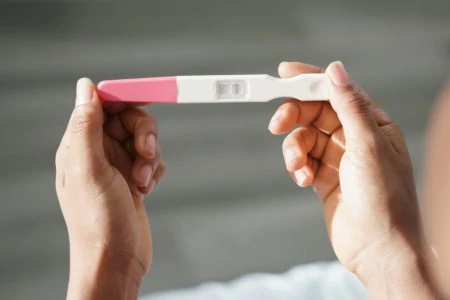If you’re like us, you probably have a couple of extra pregnancy tests stashed away somewhere — just in case. But you may wonder if they’re still usable once their expiry date has passed. Do home pregnancy tests even truly expire?
Having wondered this ourselves, we did some research to find out how valid an expired test is. We also created this guide to answer all your questions about how home pregnancy tests work, when to take one, if and when they expire, and what to expect when using an expired test.
Key Takeaways
- Home pregnancy tests do expire, with a typical shelf life of two to three years from when they are produced. However, it is possible for expensive tests to be viable well beyond their expiration date and for cheap tests to no longer work months earlier.
- Expired pregnancy tests are less likely to detect the pregnancy hormone as the chemical reactant has degraded, which can lead to false-negative results.
- False-positive results with an expired pregnancy test are rare, but can occur if the test has been exposed to heat or moisture.
- Reasons for a false result can also include taking the test too early, user error, urine being too diluted, and ectopic pregnancy.
How Do Home Pregnancy Tests Work?
Early in pregnancy, a hormone called human chorionic gonadotropin (hCG) increases rapidly day by day. This hormone is made by the placenta and supports the development of your growing baby.
The test strip in a home pregnancy test contains a chemical that detects the hCG in your urine, confirming whether or not you’re pregnant.
Do Home Pregnancy Tests Expire?
Many women never think to look for an expiration date, but home pregnancy tests do expire. They all have an expiration date listed on the box or outside the packaging of the test.
This date is set at the chemical’s expected shelf life. Once a test is expired, it is essentially no longer valid, as the chemical will be ineffective at detecting hCG in your urine.
When Do They Expire?
This time frame varies, but most pregnancy tests typically expire between two to three years from when they’re produced. The less expensive tests usually expire sooner, while pricier ones tend to have a longer shelf life.
It is possible for expensive tests to be viable well beyond their expiration date. On the other hand, it’s also possible for cheap tests to no longer work months earlier as they might contain low-quality chemical reagents. This is why it’s recommended to purchase tests at least six months before their expiry date.
Are Expired Tests Accurate?
Most home pregnancy tests claim to be 97 to 99 percent accurate when used correctly and taken one week after a missed period (1). But does this hold up for an expired test?
It is possible for a home pregnancy test to be viable after its expiration date. However, most of the time, they are more likely to give false results.
Take Note
Expired pregnancy tests are less likely to detect the pregnancy hormone as the chemical reactant has degraded. This can leave you with a negative test result even if you are indeed pregnant. This is called a false-negative result (2).
Although rare, it’s also possible to get a false-positive result with an expired pregnancy test if the test has been exposed to heat or moisture. A false-positive is when you get a positive result but are not actually pregnant.
Other Reasons for a False Result
Besides the expiration date, there are several other reasons why you may receive a false result on a home pregnancy test.
False Negative
- Taking the test too early: You may not have had enough hCG in your urine yet if you took the pregnancy test after implantation. For best results, wait one week after your missed period to take a home pregnancy test.
- User error: User errors like checking the results too soon, misinterpreting the results, and not using midstream urine could lead to a false-negative result.
- Urine too diluted: The more dilute your urine is, the lower the concentration of hCG will be. This is why it’s recommended to use more concentrated urine (i.e., your first-morning urine).
If you think you might be pregnant even after receiving a negative result, wait five to seven days and retake the test. It may also be a good idea to buy a new pregnancy test that’s well ahead of its expiration date.
False Positive
- Ectopic pregnancy: An ectopic pregnancy happens when the fertilized egg implants somewhere other than the uterus, such as the fallopian tubes. It is not a viable pregnancy and can be dangerous, even fatal, if not treated. If you are experiencing severe abdominal pain, one-sided pelvic pain, or heavy or continuous bleeding, see your doctor as soon as possible.
- Miscarriage: It can take weeks for hCG levels to drop after a miscarriage. If you had an early miscarriage, the hCG still in your urine could be giving you a false positive reading.
- Fertility drugs: If you took the test too soon after taking a fertility drug with HCG, you could be experiencing a false-positive result.
- User error: Reading the test too soon or too late could give you invalid results. Faint evaporation lines on pregnancy tests can also be mistaken for a positive test line. To avoid any misinterpretations, carefully read the manufacturer’s instructions before using a home pregnancy test.
If you think you may be getting false results or are getting mixed results, check with your doctor and get a blood test to confirm conception (3).
Whenever you get a positive result on a home pregnancy test, you should call and schedule your first prenatal appointment. Then, start adjusting your lifestyle to accommodate your growing baby. That positive result could be a false-positive, but it’s more likely you truly are pregnant.
What To Expect With Expired Tests
What happens when you take an expired pregnancy test depends on the quality of the test, how much the chemical reactant has degraded, and whether or not you’re pregnant. You simply cannot rely on an expired home pregnancy test for accurate results.
If you choose to use an expired pregnancy test, be prepared for possible false results. Don’t jump to conclusions, as your results may or may not be accurate. It is best to buy a new test to double-check your results.
An expired test is considerably more likely to give a false-negative result than a false-positive result. If you take an expired test and it is positive, you are most likely pregnant, but it’s wise to take a new test or visit your doctor for confirmation.
Editor's Note:
Caitlin Goodwin, MSN, RN, CNMTaking a Home Pregnancy Test
Most health care professionals recommend waiting until one week after a missed period to take a home pregnancy test. However, some women either don’t experience a missed period or mistake implantation bleeding for a period.
So, if you absolutely cannot wait until you’ve missed your period, the earliest you should take a test is 14 days from the date you think you may have conceived.
These are some other symptoms of early pregnancy you may be experiencing during this waiting period:
- Nausea or vomiting.
- Lightheadedness.
- Fatigue.
- Tender, swollen breasts.
- Mood swings.
- Constipation.
- Food aversions or pregnancy cravings.
- Slight bleeding and cramping.
If you experience one-sided pelvic pain, intense pelvic pain, or continuous spotting or bleeding, seek care from a prenatal provider.
Editor's Note:
Caitlin Goodwin, MSN, RN, CNMIn Conclusion
Home pregnancy tests can give you fast, reliable results. But to avoid any unnecessary doubts or false results, use a home pregnancy test long before its expiration date.
Most tests typically last two to three years from the manufacturing date. Around the expected expiration date, the chemical reactant in the test strip begins to degrade and loses its ability to detect the hCG hormone. This leaves you with possible false results and worries.




